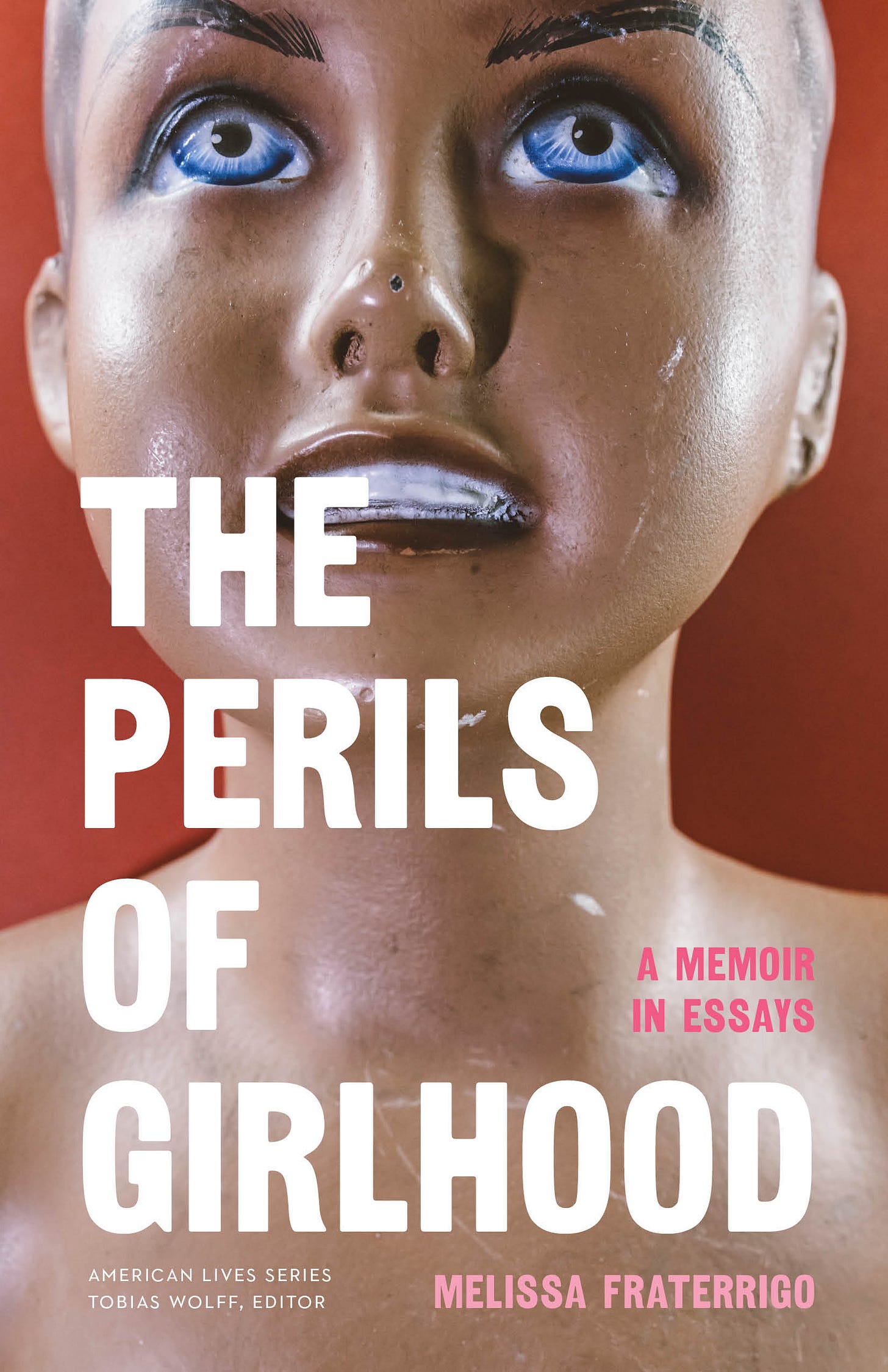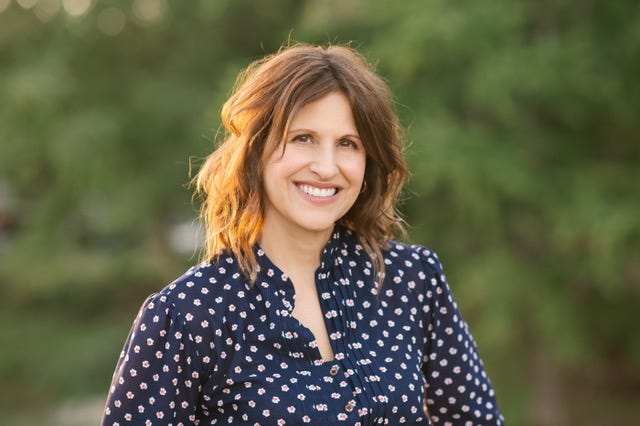Q&A: On ‘The Perils of Girlhood,’ with author Melissa Fraterrigo
The memoir built on a collection of essays from the head of the Lafayette Writers' Studio was released Monday.
Thanks to sponsor Stuart & Branigin for continued support of the Based in Lafayette reporting project.
Q&A: ON ‘THE PERILS OF GIRLHOOD,’ WITH AUTHOR MELISSA FRATERRIGO
Melissa Fraterrigo, a West Lafayette-based author who leads the Lafayette Writers’ Studio, is back with the release this week of her third book, “The Perils of Girlhood.”
Moving from fiction, Fraterrigo turns to memoir, this time leaning into reflections on growing up in the ‘80s and ‘90s for a collection of essays that, in some ways, became a letter to her daughters.
“My daughters were on a cusp of adolescence at the time, and I would start to hear from them criticisms of themselves – their bodies, their doubts or saying something about not liking themselves,” Fraterrigo, who teaches writing courses at Purdue and Butler, said ahead of Monday’s release from University of Nebraska Press.
“So, by starting this process of reflecting on my own life,” she said, “I considered how I might use those insights to kind of support my daughters and help them navigate their own girlhoods.”
Here are excerpts of a conversation we had late last week about the book, about sometimes fraught passage from high school in Illinois to college in Iowa to career and parenthood in West Lafayette, and the friendships and pop culture running through “The Perils of Girlhood.”
Question: Let’s start even before the first page. You open with lyrics from Liz Phair’s “Help Me Mary” off “Exile in Guyville” from 1993. Well played. How does that set things up for “The Perils of Girlhood.”
Melissa Fraterrigo: Liz Phair is someone I listened to with my friends nonstop, really, at the University of Iowa. She had these anthems for our generation of women. I think of Kurt Cobain in the ‘90s bringing in the grunge movement and speaking to Gex X. But Liz Phair did her own thing. She did it for women and gave female students such as myself in our early 20s an opportunity to say, I can call the shots just as well as you can.
Question: That track gets into being egged on, getting mad about it and the pressure to “memorize their stupid rules” to simply deal with people. Is that a tone you were trying to set?
Melissa Fraterrigo: Yeah, it’s just this idea that “I’ll show them just how far I can bend.” It speaks to how we live our own lives, we have our own existence and, by and large, we fit in and do these things so that we don't stand out. But oftentimes, in the background and in our own minds, there are other thoughts brewing and other feelings. Sometimes we're fitting in because we feel like we have to, but that doesn't mean that we're always going to fit in, and it certainly doesn't mean that’s how we really want to be seen.
Question: That seems to be the thread of the essays here.
Melissa Fraterrigo: I wanted to look at how girls, by and large, start to minimize their wants and needs as we move from the end of childhood into adolescence and adulthood. I wanted to look at the lessons of girlhood and womanhood throughout those different stages.
Question: How did you pull that together? Were these essays written at different times? Was it a continuous, concerted process to work through? How were they assembled into the book?
Melissa Fraterrigo: I’m a fiction writer by trade. My first two books were fiction – a collection of short stories, “The Longest Pregnancy,” and then in 2017 I published “Glory Days” with the same press, University of Nebraska Press. I've always I love fiction, and yet, during the pandemic, I suddenly was unable to write fiction. I remember I was working on a story, I would get a couple sentences down, maybe get a paragraph down, but I just wasn't interested in the work. I instead found myself gravitating toward true stories, toward memoir and personal essays. I was really drawn to the sense of how the writers of those pieces were wrestling with something larger than themselves on the page. In fiction, we've got this conflict, whether it be a novel or short stories, where things are kind of resolved at the end. What was intriguing to me in the essay form is how a writer was trying to make sense of something, and they were going through this process of discovery on the page, and I felt very much a part of that unfolding.
I remember specifically reading an essay called “Under the Influence,” by another Indiana author, Scott Russell Sanders. It's probably 20 years old now, but it details his father's alcoholism and how Sanders, by then in his 40s with his own son, is thinking back about how the signs were there, and yet also how that affected him. I was fixated on this idea, like, wow, he's in his 40s, he probably lived with his parents – we all spent 18 years under our parents’ roofs – and he was still mulling this over. I started to think about how so much of our lives remains with us, for better or for worse, for the scars of childhood, but also the way in which we overcome things and we struggle with things and how we take that with us into adulthood. That essay kind of gave me permission to explore my own life.
The first essay that I wrote is the fifth one in the book, “More Like Dad. “It has to do with my own dad's anger and how as a child I felt that if I could be perfect, I could help control his outbursts. So, I'm drawn to this memoir form. I'm thinking about my own my own past with my parents. At the same time, I’m beginning to notice how some of my own temper is coming out in my interactions with my daughters. I remember, specifically, we were trying to stain our fence, and I had rented one of those pressure washers. I couldn’t get it to turn over and my daughter asked me something, and I just yelled at her. Just jumped down her throat. And I could see this disappointment just cascade over her face. In the moment, I obviously apologized, but it wasn't until I was working on that essay that I was able to really start to see some of those connections between my past as a child and the way that I was interacting with my daughters.
Question: Writing about people in your life and exposing yourself, there are some perils there, too. Did you find that to be true as you worked through “The Perils of Girlhood?”
Melissa Fraterrigo: When you're writing fiction, you're standing behind the guise of this character that you've created that is from your imagination. I never wrote autofiction. My stories were always purely of my imagination. When you're writing memoir, when you're writing nonfiction, these are real individuals in your lives, and people can be hurt. It also requires a fair bit of bravery, so initially I had to draft those pieces as if nobody else was ever going to read them. … I think the true grace of memoir is that it's also an opportunity to kind of soften your approach to yourself and to other people and think, hey, we were all doing the very best that we could with what we what we had.
Question: The alternative would be to make yourself the hero of every story. We’ve all been around those people.
Melissa Fraterrigo: Maybe this goes back to your previous question about the perils. As I saw my own daughters on the precipice of becoming teenagers and seeing them struggle with body image and struggle with their own sense of self, just like I did – just like probably everybody does – the one thing I thought that I could possibly offer them was the stories, the anecdotes from my own life, just so that they maybe didn't feel so alone.
Question: So, you’ve had some time to reflect as the book release arrived. Do you feel this collection landed where you wanted it to?
Melissa Fraterrigo: I vacillate. There are still some nerves, simply because I am sharing so many personal stories that are all suddenly in one place – and some stories that have not been shared previously. But I've also been really heartened by some messages that I've been receiving from other individuals, from women and men, who felt like they related to the book in a way that surprised them. … For me, I love this idea that the book, in some way, is encouraging other people to look at their own lives and hopefully consider that maybe there's something else that somebody they love does not know about their past, and maybe it's time to share that.
Question: The collection is thick with ‘80s and ‘90s references. How important was that for you to get right?
Melissa Fraterrigo: I think the death knell of memoir is this idea of navel gazing – this idea that, “Oh, let me tell you about my life and how hard I've had it.” I wanted to make sure that the book expanded well beyond my experience. That's where some of those pop culture elements fit in. You know, I've got Liz Phair, but there's Madonna in it. We've got TV shows like “Who’s the Boss.” We've got references to movies. I wanted the book to pin the reader in a specific space and time and what it was like being in the ‘80s and ‘90s. And I do think that pop culture was part of the message that we were receiving about gender, about power, about, you know, the male gaze. I think that fit in, as well.
Question: You mentioned to me a while back that you might put together a playlist to go with the book. Did you get that done?
Melissa Fraterrigo: I have a “Perils of Girlhood” playlist for you on Spotify. I think it’s a lost art form, when we used to make each other tapes and burn CDs. There’s just something really beautiful about it, putting together a playlist. So, here you go. Enjoy.
For more
“The Perils of Girlhood” (University of Nebraska Press) was released Monday, Sept. 1. A book release party will be 6:30-7:30 p.m. Sept. 10 at Second Flight Books, 2122 Scott St. in Lafayette.
Fraterrigo also will host an online writing workshop from 6:30-8 p.m. Wednesday, Sept. 3, for anyone who buys or pre-ordered “The Perils of Girlhood.” Get details and register here.
Thanks, again, to sponsor Stuart & Branigin for continued support of the Based in Lafayette reporting project.
Thank you for supporting Based in Lafayette, an independent, local reporting project. Free and full-ride subscription options are ready for you here.
Tips, story ideas? I’m at davebangert1@gmail.com.





Love that you cover our excellent local writers!
Thanks so much for taking the time and interest, Dave. I loved chatting with you!! See you on the dance floor!